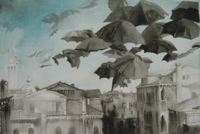Difference between revisions of "Miasma"
(Created page with 'File:lighterstill.jpgright|frame ==Origin== New Latin, from Greek, defilement, from ''miainein'' to pollute *[http://en.wikipedia.org/wiki...') |
m (Text replacement - "http://" to "https://") |
||
| Line 3: | Line 3: | ||
==Origin== | ==Origin== | ||
New Latin, from [[Greek]], defilement, from ''miainein'' to [[pollute]] | New Latin, from [[Greek]], defilement, from ''miainein'' to [[pollute]] | ||
| − | *[ | + | *[https://en.wikipedia.org/wiki/17th_century 1665] |
==Definitions== | ==Definitions== | ||
*1: a vaporous exhalation formerly believed to cause [[disease]]; also : a heavy vaporous [[emanation]] or atmosphere <a ''miasma'' of tobacco smoke> | *1: a vaporous exhalation formerly believed to cause [[disease]]; also : a heavy vaporous [[emanation]] or atmosphere <a ''miasma'' of tobacco smoke> | ||
2: an [[influence]] or [[atmosphere]] that tends to deplete or [[corrupt]] <freed from the miasma of [[poverty]] — Sir Arthur Bryant>; also : an atmosphere that [[obscures]] : [[fog]] | 2: an [[influence]] or [[atmosphere]] that tends to deplete or [[corrupt]] <freed from the miasma of [[poverty]] — Sir Arthur Bryant>; also : an atmosphere that [[obscures]] : [[fog]] | ||
==Description== | ==Description== | ||
| − | In [ | + | In [https://en.wikipedia.org/wiki/Greek_mythology Greek mythology], a '''miasma''' is "a [[contagious]] [[power]] ... that has an independent life of its own. Until [[purged]] by the [[sacrificial]] [[death]] of the wrongdoer, [[society]] would be chronically infected by [[catastrophe]]." |
| − | An example is [ | + | An example is [https://en.wikipedia.org/wiki/Atreus Atreus] who invited his brother [https://en.wikipedia.org/wiki/Thyestes Thyestes] to a delicious stew containing the [[bodies]] of his own sons. A ''miasma'' contaminated the entire [[family]] of Atreus, where one violent [[crime]] led to another, providing fodder for many of the Greek heroic tales. However, attempts to cleanse a [[city]] or a society from ''miasma'' may have the opposite effect, that of reinforcing the miasma. |
[[Category: Mythology]] | [[Category: Mythology]] | ||
Latest revision as of 01:21, 13 December 2020
Origin
New Latin, from Greek, defilement, from miainein to pollute
Definitions
- 1: a vaporous exhalation formerly believed to cause disease; also : a heavy vaporous emanation or atmosphere <a miasma of tobacco smoke>
2: an influence or atmosphere that tends to deplete or corrupt <freed from the miasma of poverty — Sir Arthur Bryant>; also : an atmosphere that obscures : fog
Description
In Greek mythology, a miasma is "a contagious power ... that has an independent life of its own. Until purged by the sacrificial death of the wrongdoer, society would be chronically infected by catastrophe."
An example is Atreus who invited his brother Thyestes to a delicious stew containing the bodies of his own sons. A miasma contaminated the entire family of Atreus, where one violent crime led to another, providing fodder for many of the Greek heroic tales. However, attempts to cleanse a city or a society from miasma may have the opposite effect, that of reinforcing the miasma.
